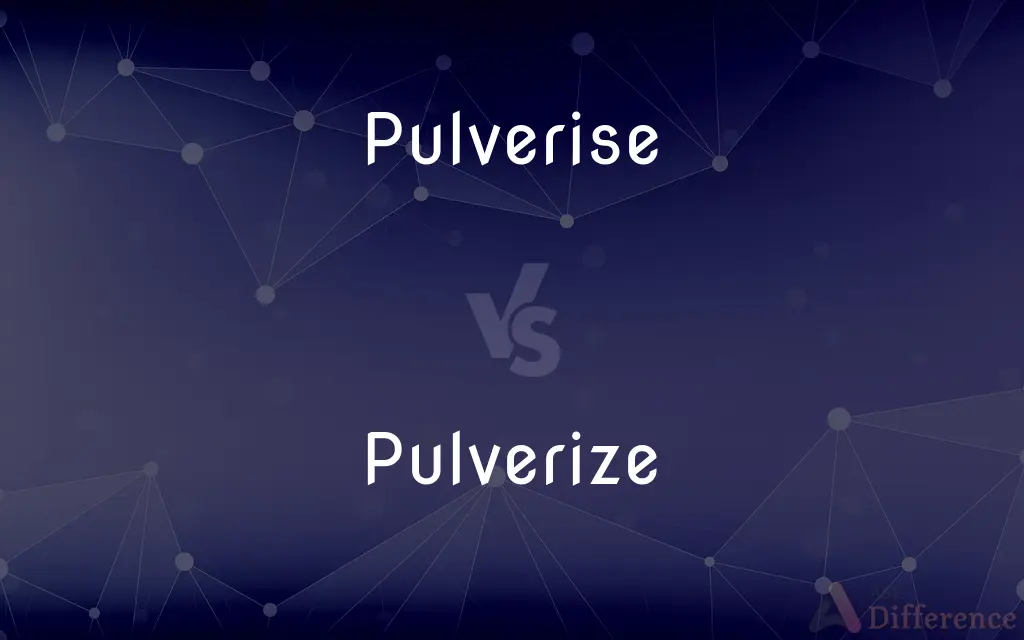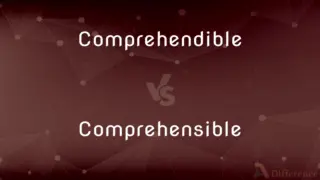Pulverise vs. Pulverize — What's the Difference?
By Tayyaba Rehman & Urooj Arif — Updated on April 26, 2024
"Pulverise" and "pulverize" are variants of the same verb, meaning to reduce to fine particles; "pulverise" is the British spelling, while "pulverize" is American.

Difference Between Pulverise and Pulverize
Table of Contents
ADVERTISEMENT
Key Differences
"Pulverise" is commonly used in British English to describe the action of grinding or crushing something into a fine powder or dust. On the other hand, "pulverize" is the preferred spelling in American English, carrying the same meaning.
In academic and professional contexts in the UK, "pulverise" appears in technical documents and literature, whereas in the US, "pulverize" is more likely to be seen in similar texts.
When it comes to digital content and online publications, British sites maintain the use of "pulverise." Conversely, American sites predominantly feature "pulverize."
In terms of pronunciation, both words sound the same, emphasizing their interchangeable usage in spoken English, while the spelling difference becomes apparent only in written form.
Language learners often encounter "pulverise" in British English materials, such as textbooks and exams from UK institutions, while "pulverize" is taught in American English settings.
ADVERTISEMENT
Comparison Chart
Spelling Variation
British English
American English
Usage in Literature
Common in UK books and papers
Common in US books and papers
Online Usage
Predominantly on British websites
Predominantly on American websites
Pronunciation
Same as "pulverize"
Same as "pulverise"
Educational Material
Found in UK educational materials
Found in US educational materials
Compare with Definitions
Pulverise
To demolish completely.
The old building was pulverised to make way for new development.
Pulverize
To become powder or dust.
With age, these materials tend to pulverize.
Pulverise
To become powder or dust.
The dried leaves pulverise easily.
Pulverize
To crush into powder.
Use the mortar to pulverize the spices.
Pulverise
To defeat utterly.
The team was pulverised in the final match.
Pulverize
To grind thoroughly.
This device is designed to pulverize nuts for baking.
Pulverise
To crush into powder.
The machine can pulverise any type of rock into fine dust.
Pulverize
To demolish completely.
The structure was pulverized in the controlled explosion.
Pulverise
To grind thoroughly.
The mill pulverises wheat into flour.
Pulverize
To defeat utterly.
Our debate team pulverized the opposition.
Pulverise
(transitive) To render into dust or powder.
Pulverize
To pound, crush, or grind to a powder or dust.
Pulverise
(transitive) To completely destroy, especially by crushing to fragments or a powder.
Pulverize
To overwhelm or defeat utterly
The visitors pulverized the home team.
Pulverise
(transitive) To defeat soundly, thrash.
Pulverize
To be ground or reduced to powder or dust.
Pulverise
(intransitive) To become reduced to powder; to fall to dust.
The stone pulverises easily
Pulverize
(American spelling) pulverise
Pulverise
Destroy completely;
The wrecking ball demolished the building
Demolish your enemies
Pulverize the rebellion before it gets out of hand
Pulverize
To reduce of fine powder or dust, as by beating, grinding, or the like; as, friable substances may be pulverized by grinding or beating, but to pulverize malleable bodies other methods must be pursued.
Pulverise
Become powder or dust;
When it was blown up, the building powderized
Pulverize
To become reduced to powder; to fall to dust; as, the stone pulverizes easily.
Pulverise
Make into a powder by breaking up or cause to become dust;
Pulverize the grains
Pulverize
Make into a powder by breaking up or cause to become dust;
Pulverize the grains
Pulverize
Destroy completely;
The wrecking ball demolished the building
Demolish your enemies
Pulverize the rebellion before it gets out of hand
Pulverize
Become powder or dust;
When it was blown up, the building powderized
Common Curiosities
What is the origin of the word "pulverise"?
Similarly to "pulverize," "pulverise" also derives from the Latin word "pulvis."
What is the origin of the word "pulverize"?
The word "pulverize" comes from the Latin root "pulvis," which means dust.
In scientific contexts, is there a preferred term between "pulverise" and "pulverize"?
In scientific writing, the preference typically aligns with the regional spelling norms, so neither is preferred universally.
Are "pulverise" and "pulverize" considered correct in English exams?
Yes, both are considered correct, but students should use the version consistent with the variant of English being tested (American vs. British).
How do dictionaries treat "pulverise" and "pulverize"?
Most dictionaries list "pulverize" as the primary entry in American dictionaries, with "pulverise" as a variant in British dictionaries.
What tools or machines commonly perform the action described by "pulverise" and "pulverize"?
Mills, blenders, and crushers are common tools that pulverise or pulverize materials.
Can "pulverise" and "pulverize" be used in metaphoric senses?
Yes, both can be used metaphorically to describe thorough defeat or destruction.
How do online translation tools handle "pulverise" and "pulverize"?
Most online translation tools recognize both as valid English words and provide appropriate translations based on the context.
Are there synonyms that can replace "pulverise" and "pulverize" without changing the meaning?
Yes, words like "crush," "grind," and "mash" can sometimes be used interchangeably depending on the context.
What is the impact of globalization on the usage of "pulverise" and "pulverize"?
Globalization tends to increase the exposure to both forms, potentially leading to more interchangeable use in international contexts.
Is "pulverise" ever used in American English?
It is rare, but it can appear in texts that use British spelling conventions or in quotes from British sources.
Is "pulverize" ever used in British English?
While uncommon, "pulverize" may appear in British texts influenced by American English, especially in scientific or technical writing.
What advice would you give to a writer unsure about whether to use "pulverise" or "pulverize"?
Consider the primary audience and use the spelling that aligns with the version of English they are most familiar with.
How do English language learners typically learn to use "pulverise" and "pulverize"?
They are taught to use the version that aligns with the form of English they are learning (American or British).
Can the choice between "pulverise" and "pulverize" affect the readability of a text?
Yes, using the form unfamiliar to the intended audience may slightly affect readability or the perceived correctness of the text.
Share Your Discovery

Previous Comparison
Comprehendible vs. Comprehensible
Next Comparison
Frustratedly vs. FrustratinglyAuthor Spotlight
Written by
Tayyaba RehmanTayyaba Rehman is a distinguished writer, currently serving as a primary contributor to askdifference.com. As a researcher in semantics and etymology, Tayyaba's passion for the complexity of languages and their distinctions has found a perfect home on the platform. Tayyaba delves into the intricacies of language, distinguishing between commonly confused words and phrases, thereby providing clarity for readers worldwide.
Co-written by
Urooj ArifUrooj is a skilled content writer at Ask Difference, known for her exceptional ability to simplify complex topics into engaging and informative content. With a passion for research and a flair for clear, concise writing, she consistently delivers articles that resonate with our diverse audience.














































